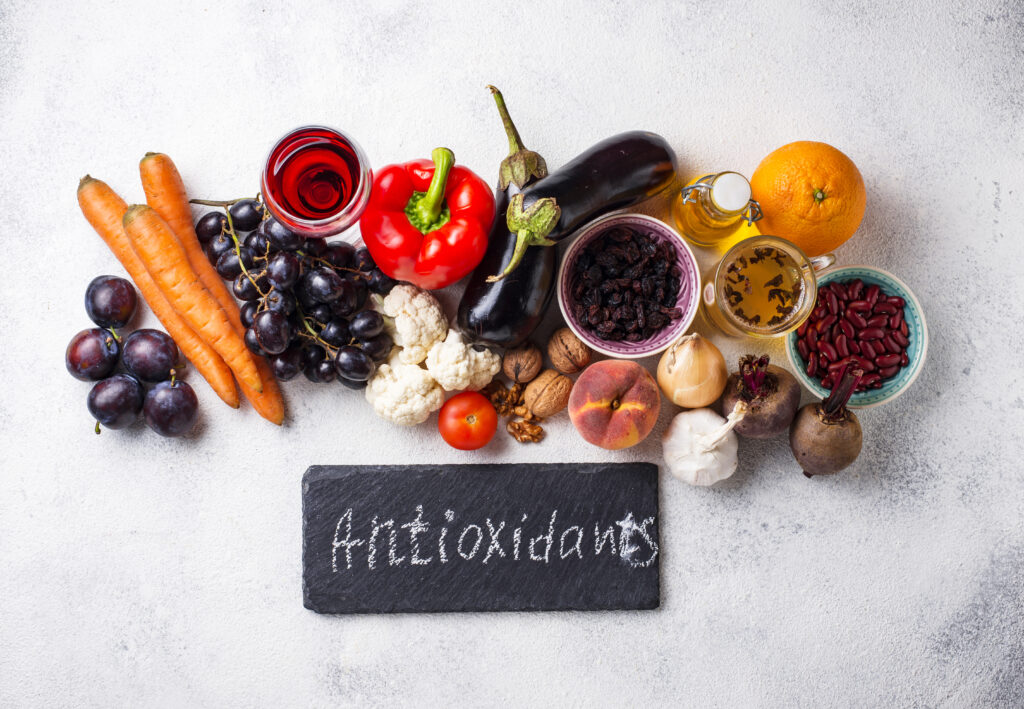
5 Menopause Support Complex Supplement to Help Ease Symptoms
Menopause support complexes are dietary supplements with herbal extracts and vitamins aimed at alleviating symptoms during menopause
We’ve all heard the hype surrounding green coffee bean extract: it’s allegedly the secret ingredient to significant weight loss. It seems like this miracle substance can make it easy to shed pounds, however, there’s more than meets the eye when it comes to green coffee bean ingestion. For those wanting to experience the weight-loss benefits, you should know there are potential side effects from consuming the supplement, which we’re going to discuss today. This blog post will answer burning questions such as, “What are the positive and negative effects of taking green coffee bean extract?”, “what health issues can be caused by its use?”, and “Are there any ways to limit the risks?”. So, if you’ve been on the fence about adding this supplement to your daily routine, then buckle up, and let’s dive into the world of green coffee beans.

The green coffee bean extract is an extract derived from unroasted, raw coffee beans. The major active ingredient in Green Coffee Extract is chlorogenic acid, which is believed to be responsible for its many potential health benefits. Supporters of the use of Green Coffee Extract argue that the compound has been researched thoroughly and can provide certain health benefits due to its antioxidant and anti-inflammatory properties. They maintain that Green Coffee Extract can help regulate blood sugar levels, aid in weight loss, and reduce blood pressure.
At the end of the day, it’s important to research any supplement before taking or recommending it and to note that there may be potential side effects associated with any form of supplementation. Understanding how different compounds in supplements interact with the body, monitoring dosage levels, and keeping abreast of current research is essential for staying informed about all aspects of health and wellbeing. With this in mind, we’ll now examine what exactly is Green Coffee Extract and what evidence supports its dietary use.

The term ‘Green Coffee Extract’ is used to refer to an extract taken from green coffee beans. Green Coffee Extract is typically a highly concentrated form of chlorogenic acid, an antioxidant polyphenol that has various pharmacological actions. The most commonly produced form of Green Coffee Extract comes from the unroasted green coffee bean, as its roasting process destroys much of the chemical compound. Because of its polyphenol makeup, proponents of Green Coffee Extract assert that it can potentially offer health benefits such as weight loss, lowered risk for type 2 diabetes, and even reduced blood pressure; however, other experts believe that the evidence supporting these claims is dubious at best and put forth the notion that the hype around Green Coffee Extract may be more attributed to marketing than actual clinical evidence.
The potential efficacy of Green Coffee Extract has been primarily evaluated in clinical trials available for analysis. These studies were comparatively small; however, there were noticeable reductions in body fat percentage, BMI, and overall weight with varying results in glucose levels and blood lipids in some cases. Yet despite these promising results on human subjects, more large-scale studies are needed to make concrete determinations regarding the safety and real-world efficacy of Green Coffee Extract as a dietary supplement.
Are There Different Types of Green Coffee Extract?
The type of green coffee extract that is used in dietary supplements can vary significantly in terms of its chemical composition and concentration. Commercially available Green Coffee Extract typically contains 50–95% total chlorogenic acids, with the percentages varying between brands, strains of the coffee bean, and the preparation method used. While there is no industry standard for the amount of Green Coffee Extract to be used, certain manufacturers may produce higher concentrations than others.
Some studies have attempted to differentiate between different types of Green Coffee Extract, such as caffeoylquinic acid-type and flavonoid-type Green Coffee Extracts, based on their respective chemical structures. However, more research is needed to determine if these two different types provide disparate health benefits or side effects when ingested.
Knowing what type of Green Coffee Extract supplement you are taking can help provide some insight into its potential side effects and benefits. So it’s important to consult a healthcare provider before beginning any sort of regimen involving Green Coffee Extract to make sure you choose the right one.
It’s also important to know that not all green coffee extracts are created equal; understanding how different types may interact with your body will enable you to make an informed decision about which one is right for you. Taking the time to do this research before starting a supplement program can help reduce the risk of potential adverse effects associated with consuming Green Coffee Extract.

Side Effects
The side effects associated with green coffee bean extract, when consumed, are largely unknown due to a lack of research. It has been suggested that Green Coffee Extract may lead to mild gastrointestinal upset, such as diarrhea, and other potential side effects, however, these effects have not been widely studied. Some studies have also suggested that Green Coffee Extract may interact with certain drugs, such as warfarin, and cause adverse reactions.
While there is currently limited evidence for the safety of Green Coffee Extract consumption, there are those who argue it does not have any adverse effects and is generally safe for most people when taken in moderation. However, this argument has yet to be substantiated by any rigorous clinical trials or studies. Others contend that Green Coffee Extract can cause some unpleasant side effects and should be used with caution until more definitive research on its safety is available.
Considering the lack of research on the potential side effects of Green Coffee Extract consumption and its need for further study, it is best to practice caution when consuming this natural substance. While it is impossible to predict how an individual will react given the limited evidence available today, knowledge of any potential risks associated with its ingestion may help prevent the presence of adverse consequences later on. With this in mind, it would be wise to exercise prudence and consider transitioning to the next section – which examines potential side effects associated with other natural substances commonly ingested.
The debate around the use of green coffee beans is hotly contested, with some touting its health benefits and others cautioning against its side effects. Many proponents of Green Bean Extract argue that it is a natural substance, making its ingestion safe for most people with few to no side effects. While there are many potential benefits associated with consuming Green Bean Extract, there may also be some side effects that should be taken into account when considering this supplement.
In terms of safety, research suggests that as long as Green Bean Extract is used in moderate amounts, taking it orally should not result in any negative side effects. However, those with a sensitivity to caffeine may want to limit their intake since consuming high levels of Green Bean Extract could lead to jitteriness, headaches, sleep disruption, or nausea. Additionally, those who are pregnant or nursing should discuss the use of Green Bean Extract with their healthcare provider before taking it due to potential risks associated with prenatal and postnatal usage.
Overall, individuals should assess their risk factors before using Green Bean Extract as a supplement and make sure to follow the recommended dosage outlined by the manufacturer. With that being said, provided that individuals follow the appropriate safety protocols, Green Bean Extract is generally thought to be beneficial without any negative side effects. As such, if one feels comfortable using this natural supplement after assessing their risk factors and talking to a health care provider about recommended dosages for safe ingestion, then they may just find that this natural ingredient brings positive results without any worrisome side effects.

The evidence of potential health benefits associated with the consumption of green coffee beans is in its early stages. Most of the research on Green Coffee Beans has been conducted in a laboratory setting and there have been few human clinical trials completed on their effects. Despite the limited study of its potential effects, many scientists have found promising evidence that may suggest some benefits from regular Green Coffee Beans ingestion.
First, natural compounds found in unroasted or raw Green Coffee Beans have been found to act as powerful antioxidants, fighting the damaging effects of free radicals that can lead to disease. Due to this effect, consuming green coffee beans regularly may help reduce oxidative stress that is linked to chronic health problems like heart disease and cancer.
Second, green coffee bean extract has been shown to contain high concentrations of chlorogenic acid, which has demonstrated blood pressure-lowering properties and may help regulate glucose levels by slowing down the rate at which carbohydrates are absorbed. This suggests that it may be useful as an aid for people with diabetes or those who are at risk for developing type 2 diabetes. Additionally, Green Coffee Beans ingestion has also been linked to increased metabolism and fat-burning potential within the body and thus aiding weight loss efforts.
Finally, several studies utilizing animal models have demonstrated the anti-inflammatory effects as well as cognitive protective abilities of green coffee beans due to their antioxidant characteristics. These effects would need further human clinical trials before their efficacy could be determined and it is still unclear how they would apply even if they proved effective when tested on humans.
Overall, while there is some promising evidence that suggests various benefits of green coffee bean ingestion, much more research needs to be done before these could be considered concrete evidence. Until solid proof is available through more extensive scientific research on the topic, any claims regarding green coffee bean benefits should be taken with a grain of salt as more data becomes available over time.

Just as the previous section discussed how superfoods can enhance skin care, they are also key players in maintaining overall health by providing vital nutrients and antioxidants. Superfruits such as blueberries, acai berries, and cranberries contain phytonutrients that lower the risk of multiple diseases, support neuron functioning, and improve overall digestion. It is further suggested that eating these nutrient-dense fruits helps reduce inflammation and provides essential vitamins to help fend off viruses.
In addition, these powerful fruits fight free radicals due to their high content of antioxidants. Antioxidants can significantly decrease oxidative damage to cells which often results in age-related diseases. Commonly found in grape skins and seeds, the antioxidant resveratrol plays a key role in controlling inflammation levels by increasing cell defense against infection.
Ultimately, these valuable superfruits provide immense health benefits that not only improve physical appearance but can slowly build up cellular defenses throughout the body. Though more research is needed to support the power of these natural ingredients, it’s clear that adding them to one’s diet would offer positive outcomes for mental and physical well-being. As this article moves forward, we will explore another way superfruit can provide protection: through dieting.
Now that we have explored the broad range of phytonutrients and antioxidants found in superfruits, let us delve into how to best incorporate them into a diet. Although superfruits are an excellent source of these essential nutrients, it is important to note that they should not become the sole source of nutrition in a diet. In addition to consuming superfruits, it is recommended to follow a balanced and varied diet with plenty of whole foods fruits and vegetables, lean proteins, healthy fats, and complex carbohydrates.
When attempting to include more nutrition-packed superfruits into a diet, the key is variety and moderation. Rather than replacing staples such as apples and oranges, focus on adding items like acai berries, goji berries, and pomegranates to existing meal plans. Additionally, focus on fresh versions of fruit over pre-packaged or frozen. Freshly-picked fruits will often contain greater concentrations of nutrients, vitamins, and minerals than their processed counterparts.
It is also important to keep in mind that certain superfruits may have interactions with medications or health conditions. Therefore, it is best practice to consult with healthcare professionals before drastically changing diets or incorporating new food items.
Ultimately, no one item constitutes a perfect superfood diet. While superfruits can be part of an overall balanced diet meant to help provide essential nutrients, many believe that no single food can offer all the required components for optimal health. By focusing on incorporating different types of nutritious foods into our diet and making mindful choices about portion sizes and ingredients, dieters can enjoy the benefits of some amazing superfruits without having to adhere to a restrictive regime.

Menopause support complexes are dietary supplements with herbal extracts and vitamins aimed at alleviating symptoms during menopause

Vitamin C, D3, Zinc, and Quercetin support immune health. They enhance immune cell function, fight infections, reduce inflammation, and provide antioxidant benefits.

Ginseng, a valued herb with adaptogenic and antioxidant properties, is popular as a supplement for improved well-being, energy, and immune function.

Nootropic supplements enhance focus, memory, and cognitive function. They boost mental clarity, motivation, and creativity for improved performance and brain health.

Garcinia cambogia, a tropical fruit, is touted for weight loss. Its active ingredient, HCA, may inhibit fat formation, but evidence is limited. Consult a professional before use.

More and more people are jumping on the mushroom supplement bandwagon these days, but you should be aware that there are potential side effects you should know about before taking the plunge. Whether you’re begging for overall well being or looking for an extra performance boost, you’re going to want to make sure you’re making an informed decision before adding mushroom supplements to your daily routine. We’ve put together a list of potential side effects to look out for, so read on and learn the truth before you start popping those pills.

Moringa, the “miracle tree,” offers numerous benefits. Moringa supplements provide essential nutrients, antioxidants, anti-inflammatory effects, and potential blood sugar and cholesterol regulation. They support immunity and combat malnutrition, but medical advice is essential.

It’s a good thing that Mother Nature both created and found cures for many of the ailments we humans suffer from. From the common cold to serious diseases, herbs have the potential to not only alleviate symptoms, but to completely prevent illnesses in the first place! Herbal remedies for immune system support have become increasingly popular as natural ways to boost your immunity against illness start to catch on.
